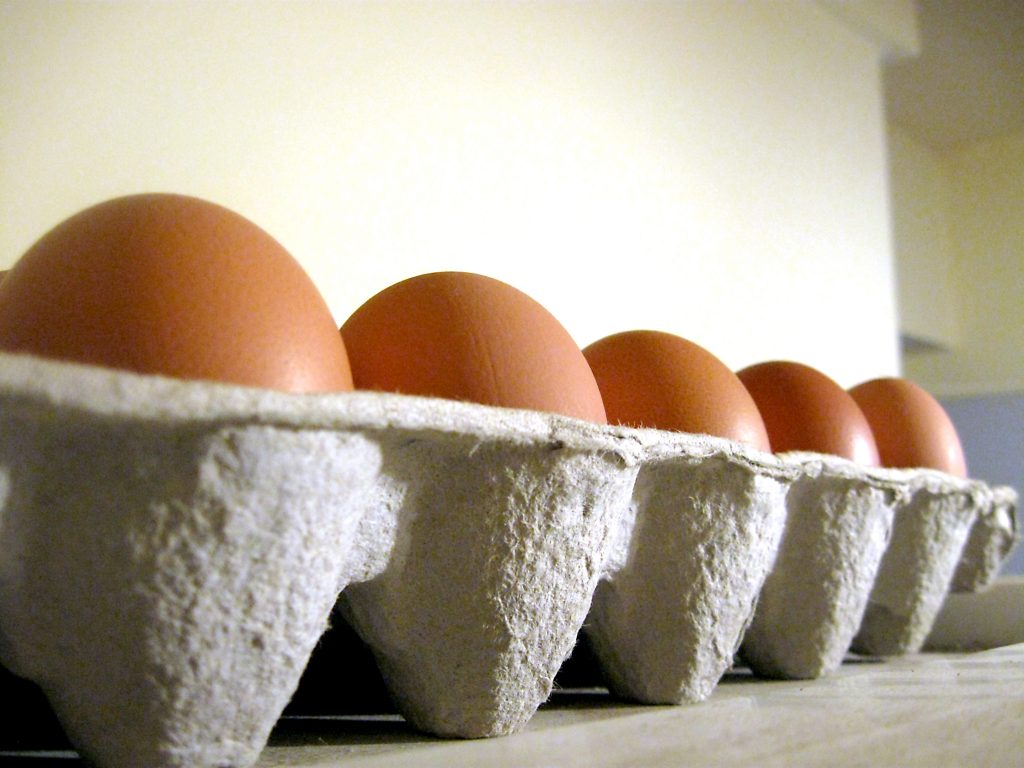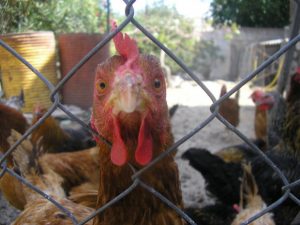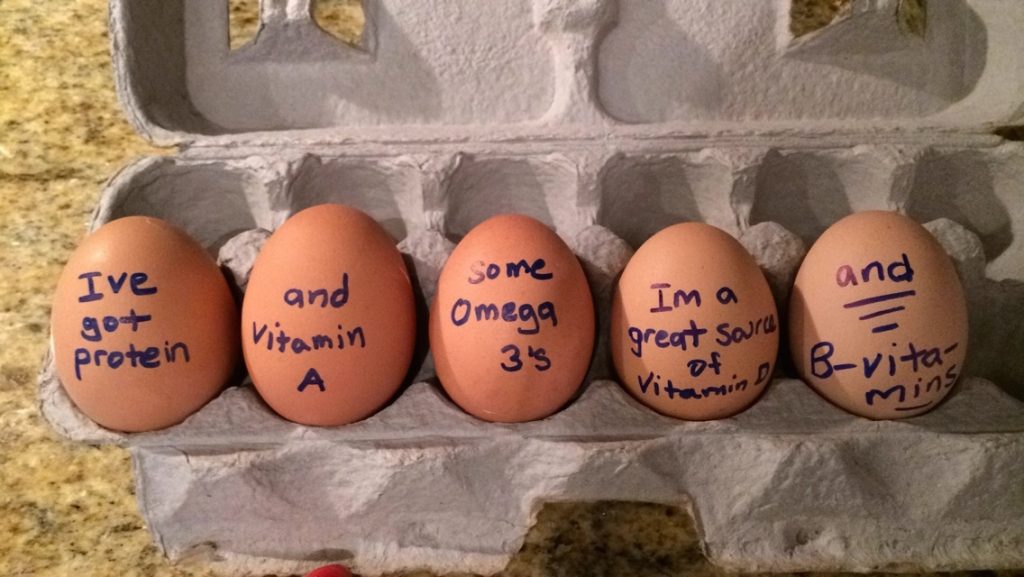
Eggs are one of the most controversial foods out there. You might wake up and see a registered dietitian on The Today Show talking about the health benefits of whole eggs (yolk included), then scroll through your Instagram feed and see a selfie of a girl with the most perfect six pack abs posing with her 6-egg white omelet (no yolks ever!) and later read an article online that says you will die 10 years sooner if you continue to eat ANY animal products. Or, maybe your doctor told you your cholesterol was high, so 2 eggs a week are your limit.
Since it’s almost Easter and a lot of people are going to be faced with the decision of whether or not to eat that 6th deviled egg or add a 3rd scoop of egg salad, let’s talk about all the BS surrounding the egg debate and whether an egg is something you should be eating or avoiding to optimize your health, fitness and life in general. We’re also going to talk about what cage-free and pasture-raised really mean for you, the chicken, and your bank account.
The Cholesterol Debate
If you ask most people why they don’t eat eggs or stick to egg whites only (even McDonalds is doing it!), their answer is usually “my doctor told me I need to lower my cholesterol.” Up until recently, the medical community thought (and some still do think) that eating foods that are high in cholesterol will raise cholesterol levels in the blood and increase the risk for heart disease. For over 40 years, the Dietary Guidelines for Americans and American Heart Association have recommended that we limit our cholesterol intake, which means less eggs, shrimp, red meats, butter and cheese.
We now know that cholesterol in food does not necessarily translate to cholesterol in the body. High levels of LDL (the bad) cholesterol in the blood still indicate a higher risk for heart disease, but not necessarily because you’ve been eating more eggs. More likely, it’s the saturated fat intake from cheeseburgers, fries and other processed and conventionally-raised meats, cheeses and food products that are responsible for that sky high LDL. Even the US Dietary Guidelines committee is on board (finally) and has found that cholesterol is “no longer a nutrient of concern.”
The Facts
Eggs have a large amount of optimum-quality, easily digestible protein. The majority of protein in eggs is contained in the whites. However, the yolks do contain most of the vitamins and minerals like vitamin D, K, B-12, selenium and potassium.
What does that really mean? All those nutrients mean big health benefits for all over the body. Here are just a few things eggs can do for you:
Maintain healthy bones: The iron, phosphorous, calcium, magnesium, manganese, zinc and vitamin D in eggs all contribute to building and maintaining bone structure and strength. Vitamin D helps with calcium reabsorption in bone tissue, which increases bone density and strength. Iron and zinc play crucial roles in maintaining the structure and elasticity of bones and joints.
Ward off heart disease: The egg’s potassium, folate and vitamin B6 content all support heart health. Vitamin B6 and folate prevent the buildup of a compound known as homocysteine. When excessive amounts of homocysteine accumulate in the body, it can damage blood vessels and lead to heart problems.
Decrease cancer risk: Vitamin A and vitamin E in eggs function as powerful antioxidants that help protect cells against free radical damage. They inhibit tumor growth, decrease inflammation in the body and help ward off or slow several types of cancer, including esophageal, lung, mouth, pharynx, endometrial, pancreatic, prostate and colon.
Improve mental health: Choline, a nutrient not commonly found in many foods but is present in egg lecithin, has been shown to improve memory and cognitive performance.
Enhance vision: Eggs contain lutein and zeaxanthin, two phytochemicals that are essential to eye health. These two carotenoids act as antioxidants in the eye to minimize damage and reduce the risk of developing age-related macular degeneration.
Now, what kind of eggs should you buy?
I know most people these days are trying to be animal friendly and buy cage-free eggs. Or maybe they think cage-free means the eggs have more nutrients, or are healthier in some way. Sorry to say, but you’ve been wasting that extra $1 per carton. Cage-free used to mean that the chickens were free to roam, but ever since the big food manufacturers figured out that people were willing to pay more, they’ve been able to manipulate the system and their packaging to make us think we’re paying for a better product and a nicer life for the little chickadee. The terms cage-free and free-range are not regulated in the US. All cage-free means these days is that hundreds or even thousands of chickens are crammed together uncaged, in a barn, and may or may not have access to the outdoors or natural light.
What about free-range? According to Vital Farms, “free-range is a term that big egg companies like to confuse you with. Done properly, like our friends over at the Happy Egg Company do it, it’s a good intermediate point between cage-free and pasture; their hens get about 11sqft of outdoor space, but they are the exception.” In Europe, free-range is legally defined as free access to outdoor areas covered with vegetation at about 43 sq.ft/bird, but in US, there is no legally binding definition for the term. Similar to cage-free, this leaves it open for companies to do what they want but still claim the label free-range and charge more for their product. Producers can provide chickens with outdoor access for as little as minutes a day in areas that are total dirt concrete with no vegetation.
Mind blown, right?
But what if you could care less about the chickens lifestyle?
 You’re still missing out on a ton of vital nutrients. When chickens get access to grass and bugs instead of a steady diet of corn-based grain, they get more nutrients, which means YOU get more nutrients.
You’re still missing out on a ton of vital nutrients. When chickens get access to grass and bugs instead of a steady diet of corn-based grain, they get more nutrients, which means YOU get more nutrients.
Compared to a conventionally raised chicken egg, pasture-raised eggs contain:
- 1/3 less cholesterol
- 1/4 less saturated fat
- 2/3 more Vitamin A
- 2 times more omega-3 fatty acids
- 3 times more Vitamin E
- 7 times more beta carotene
If you don’t believe me, just crack a regular egg and a pasture-raised egg in a pan right next to each other. The yolk of the conventionally raised egg will be a dingy yellow color and the pasture-raised egg will have a bright orange hue. You can’t deny that evidence staring right back at you– that’s beta-carotene. The chickens get that beta-carotene in their diet from grass, not from a corn-based feed they eat when stuck inside a cage or a barn.
Does the color of the shell make a difference?
Not at all. The shell color depends on the type of hen laying the egg. Brown eggs come from Bovans and Ambers, while Americaunas lay pale blue eggs. The eggs a hen lays are actually the same color as her earlobes. The older a hen gets, the paler her earlobes become, and so do her eggs.
Joel Salatin (I just love this guy!) showing us how to properly raise chickens at Polyface Farm:
So where should you buy your eggs?
Your local farmers market! Support and get to know your local farmer first. If you aren’t sure how he raises his chickens, ask!
If you can’t get to a local market, look for these brands at your grocery store or the words “pasture-raised”:
Alfresco Eggs
Backyard Eggs
Coyote Creek Farms
Handsome Brook Farm
The Happy Egg Company
Nellies
Pasture Verde
Pete & Gerry’s
Redhill Farms
Texas Chicken Farms
Vital Farms

